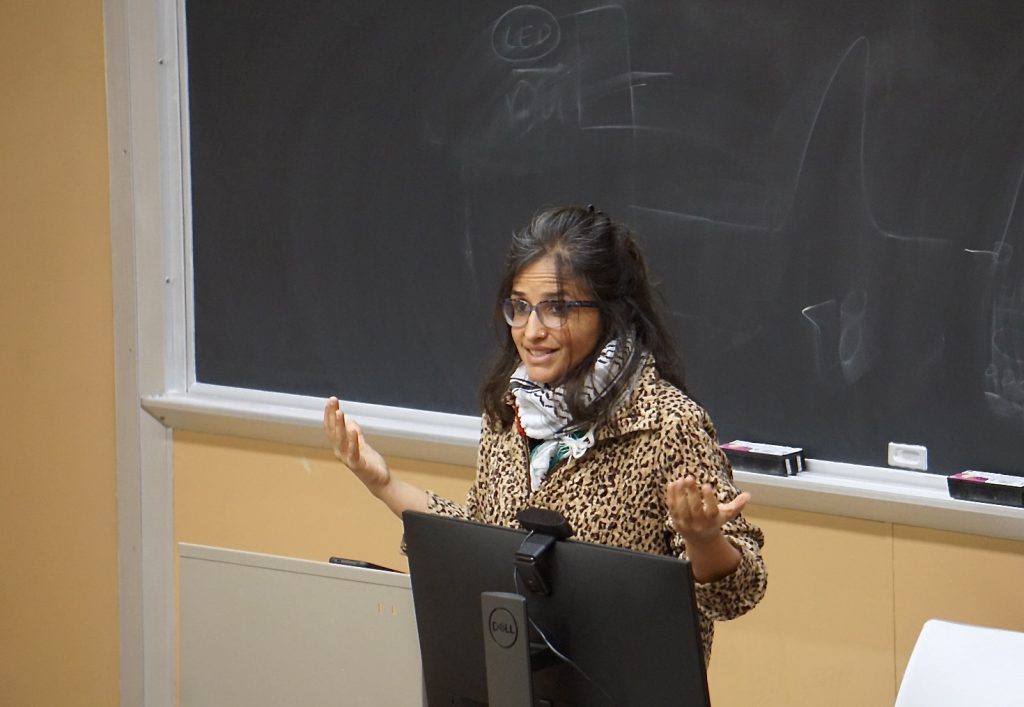Activist and author Harsha Walia spoke about issues surrounding national borders on Monday as part of the Lubna Chaudhry Human Rights Lecture Series.
Her lecture, “Abolish Border Imperialism: Migration Racial Empire and Transnational Solidarities,” addressed the intersectionality of capitalism and racism, challenging people’s perceptions of borders. Walia offered a different definition of borders, framing the word not just as lines that people cross but as “ways of thinking and being that permeate our life in many different ways.” After the discussion, students asked follow-up questions about the talk and the messaging behind it.
Walia described the impact of discussing these subjects with young people, as she believes they are deeply aware of the systemic violence at large in the world today.
“Young people are going to be the inheritors of the climate crisis and many forms of war and inequality around the world,” Walia said in an interview with Pipe Dream. “And so I think for any students who are thinking about and are curious about and really want to think about changing the social relationships in our communities, in your communities, in the ways in which you want to contribute to justice and positive change, it is so important to think about things [in] a structural way.”
Walia is a Vancouver-based activist and founder of No One Is Illegal, a feminist, anti-capitalist, anti-racist organization that advocates for the rights of Indigenous peoples and migrants. She is also the author of “Border and Rule: Global Migration, Capitalism, and the Rise of Racist Nationalism” (2021) and “Undoing Border Imperialism” (2013).
Highlighting the unnatural characteristic of borders, Walia said the creation of the U.S.-Mexico border stemmed from the forced annexation of Mexican territory after 1848, which was brought on by the capture of an Indigenous nation. She said people tend to naturalize borders’ existence, “[removing] them from entanglement with empire.”
She later said issues surrounding the border do not come about as a result of one person, like President-elect Donald Trump, or anti-migrant rhetoric. Border control is inherently structured to decide who belongs and who does not, and according to Walia, who has a right to life and dignity. She used examples, like the Chinese Exclusion Act, to demonstrate the racial exclusion at play when it comes to deportations in the United States.
“So, the idea of who is good versus bad requires a colonial, racial, gender, sexualized, ableist and classist ordering amongst all of us as well, right?” Walia said. “It’s not just about citizens versus migrants. It reproduces this in our daily lives, regardless of our citizenship. So, the rhetoric of the good versus bad immigrant or the productive and legal immigrant, exists only in relation to the so-called ‘bad immigrant,’ the so-called ‘criminal immigrant,’ the so-called ‘illegal immigrant.’”
Walia described the dehumanizing nature of victim-blaming logic often used when discussing immigration. She said that even though people are forced to migrate due to unsafe conditions in their home countries, the blame is put on them instead of the systemic structures that placed them in those conditions to begin with.
Many migrants must move through unsafe conditions — like hot deserts — where they risk dehydration, and many lose their lives. Describing these deaths at the border as “premeditated border killings,” Walia argued that prevention through deterrence policies around the world makes borders dangerous, and in many cases fatal, to keep people from crossing.
The event concluded with a Q&A session, where students asked questions regarding how to have productive conversations with loved ones about these issues and how to reconcile the fact that a large percentage of Latino communities voted for Trump and support right-wing immigration policies.
Walia said that action can be taken from anywhere and activism doesn’t necessarily need to happen on a grand scale.
“All violences are interconnected,” Walia said. “I think of it as like a knitted ball. If you pull on it from whatever direction you’re pulling at it from, you’re actually contributing to collective liberation. For me, what keeps me inspired is actually continuously thinking expansively, like not thinking about single issues, but trying to really think about if all violence is connected, that means all liberation is connected.”



